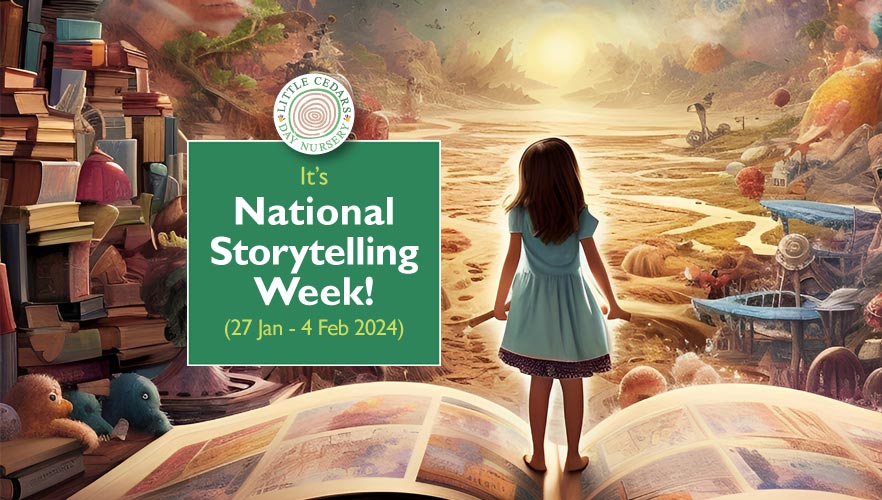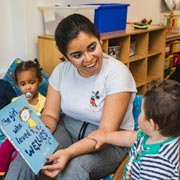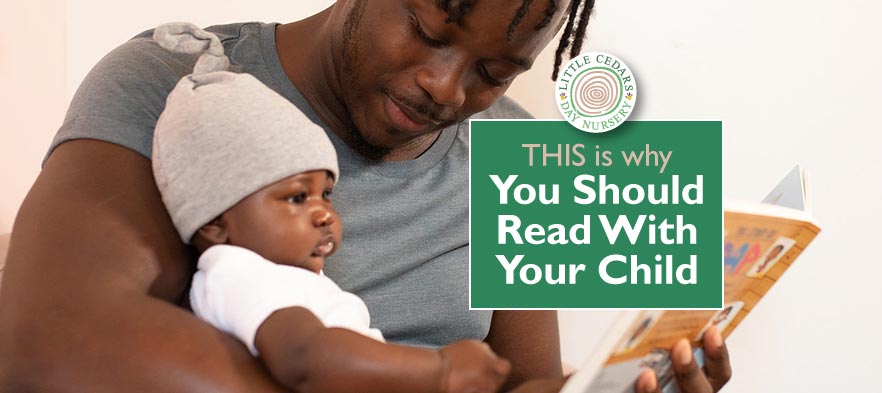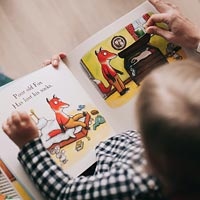
 Children and families, get ready for National Storytelling Week! For 2024, storytelling in the UK is officially celebrated from Saturday the 27th of January to Sunday the 4th of February. It’s a great opportunity for children and families to get creative and to entertain one another through the sharing of stories.
Children and families, get ready for National Storytelling Week! For 2024, storytelling in the UK is officially celebrated from Saturday the 27th of January to Sunday the 4th of February. It’s a great opportunity for children and families to get creative and to entertain one another through the sharing of stories.
Storytelling is an ancient and important tradition across the globe and one that has many benefits for both the storyteller and the listener. As such, it’s something that should be encouraged amongst children of any age. Today, we take a closer look at some of those benefits and suggest ways that both kids and families can make the most of this wonderful, free activity.
Storytelling: the Perfect Antidote to Wintery Days
 National Storytelling Week couldn’t come at a better time of year. As many across the UK have witnessed in recent weeks, January brings with it cold days, dull skies, and wintery weather. Even the daylight hours are short, limiting the number of activities children can undertake outdoors. With storytelling, however, families can be transported to any number of different locations, situations and climates, all in the blink of an eye. Indeed, storytelling can take children to places and scenarios that would simply not be possible in real life. Such is the power of this art form and the human imagination.
National Storytelling Week couldn’t come at a better time of year. As many across the UK have witnessed in recent weeks, January brings with it cold days, dull skies, and wintery weather. Even the daylight hours are short, limiting the number of activities children can undertake outdoors. With storytelling, however, families can be transported to any number of different locations, situations and climates, all in the blink of an eye. Indeed, storytelling can take children to places and scenarios that would simply not be possible in real life. Such is the power of this art form and the human imagination.
Some Benefits of Taking Part in National Storytelling Week
Whether storytelling is a simple verbal activity or dramatised in some way through acting or the use of props, it can be highly entertaining and captivating. There are also a significant number of additional benefits for both the storyteller and the listener, including:
 Stories stimulate imaginations;
Stories stimulate imaginations;- Storytelling enhances creativity;
- By showing what it’s like to be someone or even something else, stories nurture empathy;
- Storytelling can be a great way to relax;
- Storytelling helps to expand vocabulary and literacy;
- Storytelling helps to improve children’s speech and listening skills;
- Stories can be a great way to share new facts;
- Stories open up new worlds to children;
- Stories are a great vehicle for escapism, which is important, especially to those who have had a challenging day;
- Storytelling activities can even lead to careers involving writing or other creative jobs;
- Last but not least, storytelling is simply great fun!
So, all in all, there’s every reason for children and families to get involved in National Storytelling Week from Saturday the 27th of January to Sunday the 4th of February 2024. However, don’t stop there … storytelling is worthwhile any time of year!
How to Enhance Children’s Storytelling Sessions
If you’re an adult overseeing a storytelling session with children, perhaps start them off by telling them a short story yourself to get the ball rolling. They can learn from your example and then take turns to tell their story to the group. Making up brand new stories is beneficial (it will promote greater creativity) but it’s also OK for the youngest children to be influenced by existing stories they’re familiar with if they initially struggle to create something from scratch.
 Another great way to help children create new stories is to encourage them to be inspired by objects around them. For example, a teddy bear, toy character, or picture nearby may inspire them. This can be taken further by providing children with a basket of such props, for example, a toy animal, pine cone, toy crown, goblet, apple, and a rock. A ‘story scrapbook’ can be used by children in a similar way. Such things can significantly help children to become more creative and generate storyline ideas, sequencing, and plot twists.
Another great way to help children create new stories is to encourage them to be inspired by objects around them. For example, a teddy bear, toy character, or picture nearby may inspire them. This can be taken further by providing children with a basket of such props, for example, a toy animal, pine cone, toy crown, goblet, apple, and a rock. A ‘story scrapbook’ can be used by children in a similar way. Such things can significantly help children to become more creative and generate storyline ideas, sequencing, and plot twists.
Try encouraging questions and interaction from children who are listening. This will help to get them more involved and immersed in the storyline.
Another creative approach is to let them influence how the story should unfold by making suggestions along the way.
Hand or finger puppets can also be excellent, immersive tools to bring stories to life. Adding in some acting will add an extra layer of drama and entertainment to stories too, so encourage this. It can be taken to many different levels, perhaps with the use of different voices and accents, fancy dress to look like a character, introducing props and so on.
Why not set up a storytelling corner or nook? This can be used all year round and should be a quiet, comfortable space. Perhaps scatter cushions, blankets, and soft toys, and add fairly lights, props and, for young actors-in-the-making, costumes. A bespoke storytelling corner is sure to encourage children to come back to the activity throughout the year.
Such approaches are a recipe for a very entertaining, captivating and immersive storytelling session, which children will love! It’ll get them thinking deeply, stir their creative juices, boost their imaginations, and allow them to enter a different and magical reality for a short time. They’ll learn more about the world and gain improvements to skills like empathy and literacy along the way. Through the simple activity of storytelling, both the listener and storyteller will benefit in a myriad of ways. So — get children involved this National Storytelling Week and watch them blossom!
Little Cedars: Your Streatham Nursery & Preschool
A High-Quality Nursery in Streatham, near Furzedown, Tooting, Balham, Norbury & Colliers Wood


Are you searching for the perfect nursery or preschool for your child in or near Streatham? Little Cedars Day Nursery offers a high-quality home-from-home environment where babies, toddlers and preschoolers absolutely thrive. Rated as a Good Provider of childcare and early years education by Ofsted, Little Cedars represents a wonderful choice for families looking for the very best fit for their little ones. We also support a raft of free childcare funding schemes, making childcare more affordable for eligible families.
Get in touch today to find out about available childcare places, arrange a guided tour with your child, or ask any questions:
Our Streatham childcare nursery may also suit families living nearby in Tooting Common, Tooting, Streatham Hill, Streatham Park, Streatham Common, Furzedown, Tooting Bec, Tooting Broadway, Balham, Norbury and Colliers Wood.


 In April last year, we published a compelling article about
In April last year, we published a compelling article about  Reading with children also makes the task less daunting, particularly for the youngest children. Reading together also makes it more interesting and more fun. When it’s more interesting and more fun, the child is going to enjoy it more and naturally want to read more often — eventually independently — and all of that is priceless as part of their education and general knowledge going forwards. Reading can also bring parent and child closer through the time spent together. It can be great fun for the adult too, particularly when the child gets older and adults are exposed to classic children’s books that perhaps they were not, themselves, exposed to when they were young.
Reading with children also makes the task less daunting, particularly for the youngest children. Reading together also makes it more interesting and more fun. When it’s more interesting and more fun, the child is going to enjoy it more and naturally want to read more often — eventually independently — and all of that is priceless as part of their education and general knowledge going forwards. Reading can also bring parent and child closer through the time spent together. It can be great fun for the adult too, particularly when the child gets older and adults are exposed to classic children’s books that perhaps they were not, themselves, exposed to when they were young. The Nuffield Foundation’s mission is to advance social wellbeing and educational opportunity. In a partnership with the University of Newcastle, the foundation funded a deep study
The Nuffield Foundation’s mission is to advance social wellbeing and educational opportunity. In a partnership with the University of Newcastle, the foundation funded a deep study It will come as no surprise, therefore, to learn that we put all of the above into practice at Little Cedars Nursery in Streatham. Getting closely involved in children’s reading, using a huge variety of reading material in an interactive way, gives our nursery children the very best start in life. Indeed, our childcare professionals prepare them thoroughly for school by the time they leave us. They take with them reading, writing, literacy, language, vocabulary and self-expression skills in the process — and all this accomplished at least in part through guided reading.
It will come as no surprise, therefore, to learn that we put all of the above into practice at Little Cedars Nursery in Streatham. Getting closely involved in children’s reading, using a huge variety of reading material in an interactive way, gives our nursery children the very best start in life. Indeed, our childcare professionals prepare them thoroughly for school by the time they leave us. They take with them reading, writing, literacy, language, vocabulary and self-expression skills in the process — and all this accomplished at least in part through guided reading.